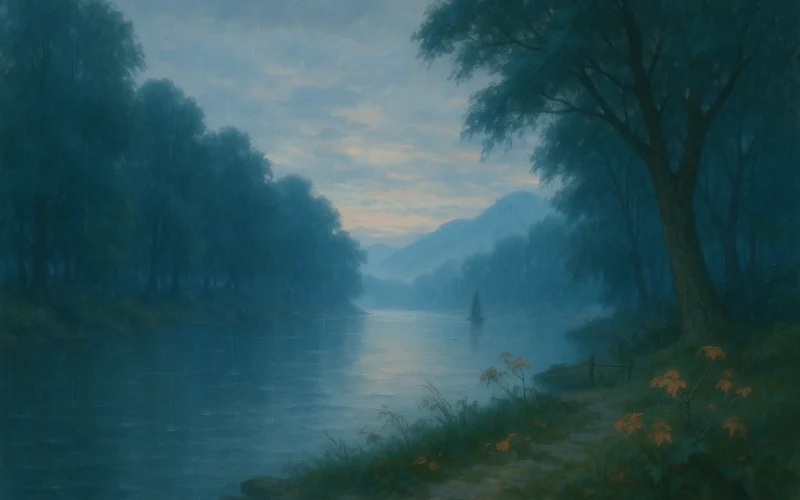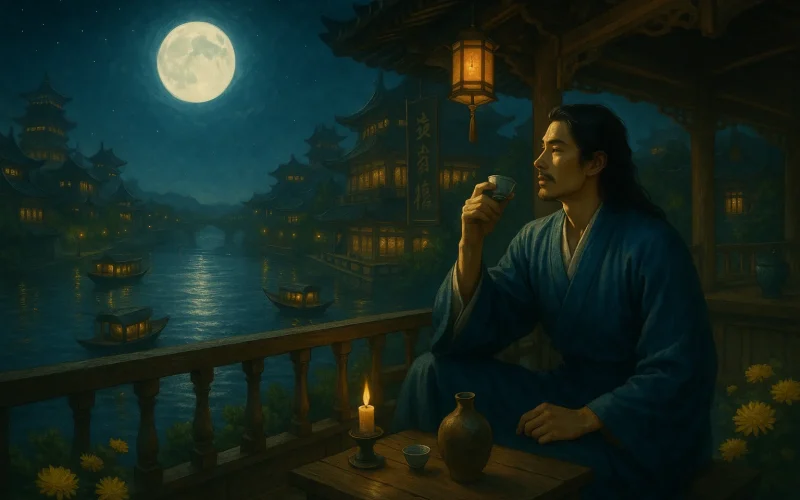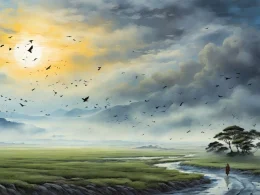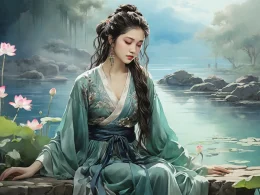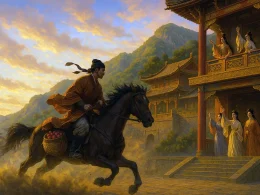Long have I failed to raise the parrot-shell cup,
Spring sorrows cling like phoenix towers’ gloom.
Sail-shadows glide past unhindered trees,
Rain-mists surge with the tide’s return.
Mountains stand as old friends for wine’s cheer,
Flowers bloom like regrets—gone, never reappear.
Frost-fences and wind-pavilions—yearly sight,
I squander scenes that roll back in time’s flight.
Original Poem
「暮步至江上」
吕本中
客事久输鹦鹉杯,春愁如接凤凰台。
树阴不碍帆影过,雨气却随潮信来。
山似故人堪对饮,花如遗恨不重开。
雪篱风榭年年事,辜负风光取次回。
Interpretation
Composed during Lü Benzhong's twilight years in Jiangnan amid unending warfare and political turmoil, this poem crystallizes the Southern Song literati's dual consciousness—caught between lingering grandeur and present displacement. Written during an evening riverside stroll, it intertwines immediate landscapes with cultural memory, where "parrot cups" and "phoenix terraces" become portals to lost glory.
First Couplet: "客事久输鹦鹉杯,春愁如接凤凰台。"
Kè shì jiǔ shū yīngwǔ bēi, chūn chóu rú jiē fènghuáng tái.
Too long defeated in worldly games—
even the parrot cup eludes my grasp.
Spring sorrows loom
like Phoenix Terrace's unreachable height.
The opening juxtaposes two iconic motifs: the "parrot cup" (鹦鹉杯), symbolizing Tang-era poetic revelry now lost to the poet, and "Phoenix Terrace" (凤凰台), evoking Li Bai's legendary ascent to celestial perspective. Their pairing underscores cultural continuity severed by contemporary strife.
Second Couplet: "树阴不碍帆影过,雨气却随潮信来。"
Shù yīn bù ài fān yǐng guò, yǔ qì què suí cháo xìn lái.
Tree shadows never hinder passing sails,
yet rain-mist rides the tidal surge unasked.
Here, nature's dualities mirror human experience: the permeable ("unhindered sails") versus the inevitable ("invasive mist"). The tidal rain (潮信雨), traditionally a metaphor for dynastic cycles, becomes an unstoppable force of change.
Third Couplet: "山似故人堪对饮,花如遗恨不重开。"
Shān sì gùrén kān duì yǐn, huā rú yíhèn bù chóng kāi.
Mountains stand as old friends for shared wine,
while blossoms—like regrets—
never rebloom.
The enduring hills embody Confucian constancy; the ephemeral flowers, Daoist acceptance of flux. Their contrast epitomizes the Southern Song mind—rooted in tradition yet forced to adapt to rupture.
Fourth Couplet: "雪篱风榭年年事,辜负风光取次回。"
Xuě lí fēng xiè nián nián shì, gūfù fēngguāng qǔcì huí.
Snow-fenced pavilions return each year,
yet I, distracted,
let their beauty pass unseen.
The finale's "snow fences" (雪篱)—emblems of Jiangnan's delicate beauty—highlight the poet's self-reproach. His "distracted returns" (取次回) confess a scholar's failure to fully inhabit the present, torn between memory and duty.
Holistic Appreciation
This poem maps a psychological journey along the riverbank. From initial defeats ("parrot cup lost") through nature's paradoxes (permeable shadows/unstoppable tides), it arrives at existential choices: commune with eternal hills or mourn unreturning blossoms. The closing admission—of beauty overlooked—reveals the Southern Song dilemma: how to appreciate fragile grace while bearing history's weight.
Artistic Merits
- Motif Transmutation
Tang symbols (parrot cups, phoenix terraces) are repurposed as Southern Song elegy, honoring cultural lineage while acknowledging its rupture. - Hydrological Metaphysics
The tidal rain (潮信雨) merges natural observation with dynastic fatalism—a characteristically Song synthesis. - Botanical Dialectic
Eternal hills versus ephemeral flowers dramatize the Confucian-Daoist tension in exile mentality. - Confessional Restraint
The finale's self-reproach ("distracted returns") conveys more regret through understatement than lament could achieve.
Insights
Lü's riverscape teaches that cultural survival demands both remembrance and presence. The "parrot cup" must be remembered, but the "snow fences" must also be seen. His poem thus becomes a method: by walking the shoreline where history and immediacy meet, one cultivates the dual vision needed to endure collapse—grieving what's lost while receiving what still flowers. For modern readers, it models how to dwell in fracture without abandoning beauty's witness.
About the Poet
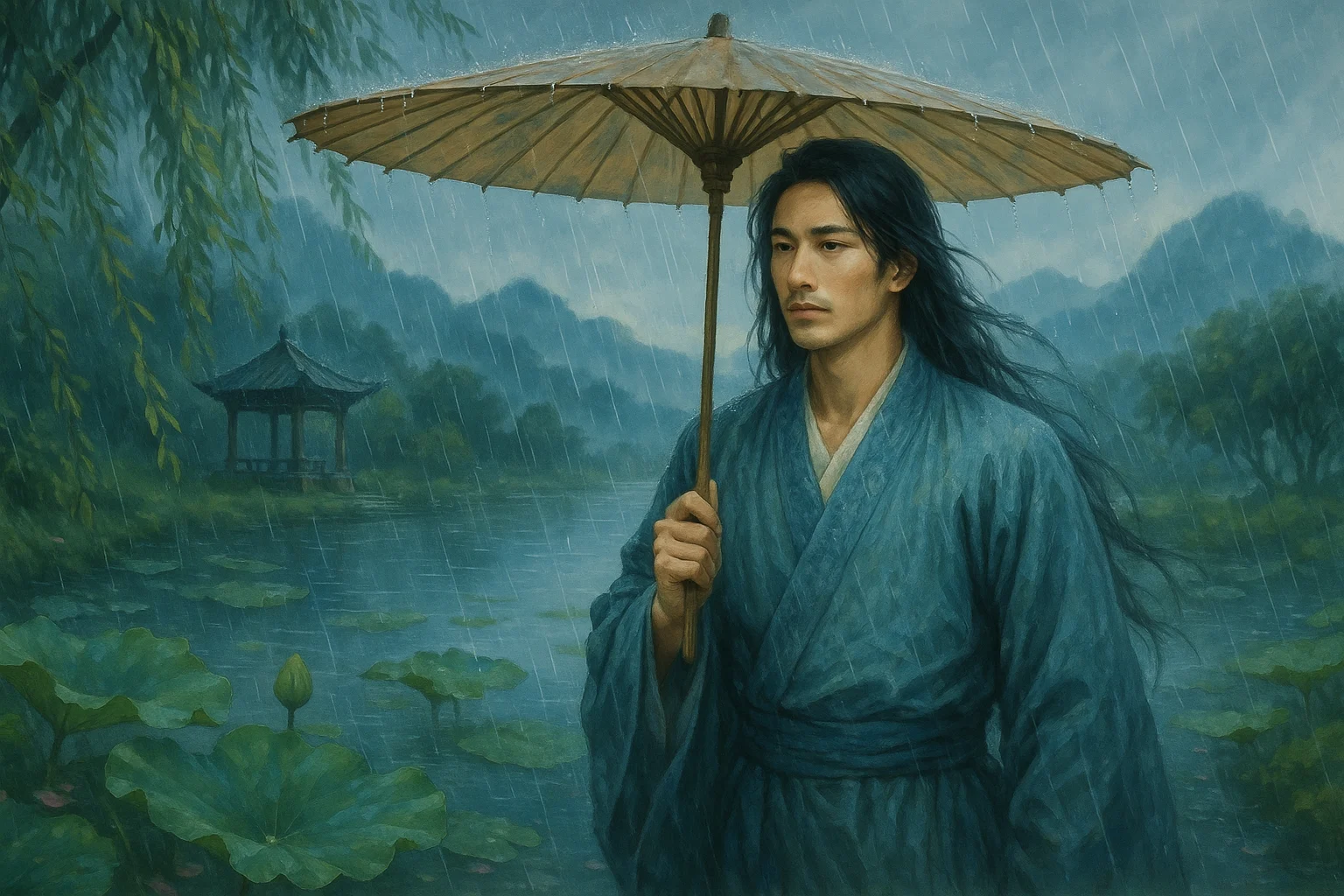
Lü Benzhong (吕本中 1084 - 1145), a native of Shouxian in Anhui, was a renowned poet and Neo-Confucian scholar of the Southern Song Dynasty. As a key theorist of the Jiangxi Poetry School, he proposed the concept of "living method" (huofa), advocating for natural variation within established poetic rules. With over 1,270 surviving poems, his Genealogy of the Jiangxi Poetry School (Jiangxi Shishe Zongpai Tu) established Huang Tingjian as the school's patriarch, profoundly influencing Song poetic theory and serving as a bridge between the Jiangxi School and the Four Masters of the Mid-Song Revival.






